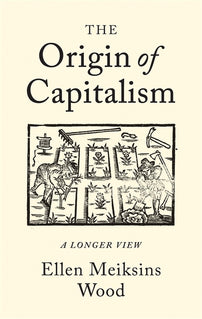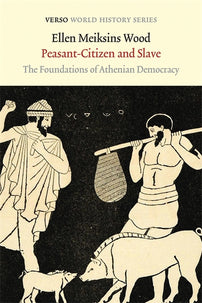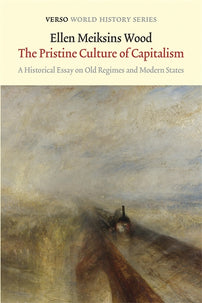Ellen Meiksins Woods: Capitalism and Human Emancipation
Ellen Meiksins Woods analyses the prospects for emancipation in contemporary capitalism.

Ellen Meiksins Wood (1942-2016) was a leading political theorist and one of the world's most influential historians. Her wide-ranging and original work, covering topics which range from examinations of Athenian democracy to contemporary American imperialism, has, alongside Robert Brenner, inaugurated the 'Political Marxist' approach to history.
This piece was originally delivered as an Issac Deutscher memorial lecture published in NLRI/167,
Let me say something, first, about Isaac Deutscher, not just in some ritual tribute for the occasion but because it seems appropriate to what I am going to say in my lecture and the spirit in which I intend to say it. [*] I did not know Isaac Deutscher, but I have formed a pretty strong impression of the kind of man he was, and the kind of political voice he represented; and it seems to me precisely the kind of voice we need a lot of now. Like many others, I have been impressed in particular by the stability and balance of his commitment to socialism—and I say stability quite deliberately, to convey not a stubborn dogmatism but, on the contrary, the kind of balanced, independent and critical judgment which allowed him, for example, to praise without apology the achievements and promise of the October Revolution while never disguising the horrors of its deformations, at a time when so many others were swinging wildly between blind worship and abject recantation of socialism altogether. Or the stability which kept him working as a Marxist intellectual through periods of muted class struggle, while so many others gave up and went off in pursuit of various intellectual and political fashions.
I think this stability had something to do with Deutscher’s measured vision of socialism, which recognized its promise for human emancipation without harbouring romantic illusions that it would cure all human ills, miraculously making people ‘free’, in Shelley’s words, ‘from guilt or pain’. He said once that socialism was not ‘evolution’s last and perfect product or the end of history, but in a sense only the beginning of history’. [1] It is just this kind of balanced judgment that we badly need today, and this means understanding not only the ways in which socialism is not the end of history, not the end of human emancipation, but also the ways in which it is the beginning. We also have to bring the same judgment to the means and agencies of socialist transformation as to its ends. Speaking to American students at the height of student activism in the 1960s, Deutscher delivered a not altogether welcome message: ‘You are effervescently active on the margin of social life, and the workers are passive right at the core of it. That is the tragedy of our society. If you do not deal with this contrast, you will be defeated.’ [2]
It seems to me that a similar contrast is our tragedy right now; and we have to face with the same balance the fact that there are strong and promising emancipatory impulses at work, but that they may not be active at the core of capitalist society and may not free us from its oppressions. We too have to deal with this contrast or be defeated.
These issues are very much alive, especially because it is no longer taken for granted on the Left that the decisive battle for human emancipation will take place on the ‘economic’ terrain, the home ground of class struggle. For a great many people, the emphasis has shifted to struggles for what I shall call extra-economic goods—gender-emancipation, racial equality, peace, ecological health, democratic citizenship. Every socialist ought to be committed to these goals in themselves—in fact, the socialist project of class emancipation always has been, or should have been, a means to the larger end of human emancipation. But these commitments do not settle crucial questions about agencies and modalities of struggle, and they certainly do not settle the question of class politics. A great deal still needs to be said about the conditions for the achievement of these extra-economic goods. In particular, if our starting point is capitalism, then we need to know exactly what kind of starting point this is. What limits are imposed, and what possibilities created, by the capitalist regime, by its material order and its configuration of social power? What kinds of oppression does capitalism require, and what kinds of emancipation can it tolerate? In particular, what use does capitalism have for extra-economic goods, what encouragement does it give and what resistance does it put up to their attainment? and so on. I want to make a start on answering these questions, and as the argument develops I shall try to throw them into relief by making some comparisons with pre-capitalist societies.
I. CAPITALIST EQUALITY AND INEQUALITY
Let me begin by saying that certain extra-economic goods are simply not compatible with capitalism, and I do not intend to talk about them. I am certain, for example, that capitalism cannot deliver world peace. It seems to me axiomatic that the expansionary, competitive and exploitative logic of capitalist accumulation in the context of the nation-state system must, in the longer or shorter term, be destabilizing, and that capitalism—and at the moment its most aggressive and adventurist organizing force, the government of the United States—is and will for the foreseeable future remain the greatest threat to world peace. Nor do I think that capitalism can avoid ecological devastation. It may be able to accommodate some degree of ecological care, especially when the technology of environmental protection is itself profitably marketable. But the essential irrationality of the drive for capital accumulation, which subordinates everything to the requirements of the self-expansion of capital and so-called growth, is unavoidably hostile to ecological balance. It has to be added, though, that the issues of peace and ecology are not very well suited to generating strong anti-capitalist forces. In a sense, the problem is their very universality. They do not constitute social forces because they simply have no specific social identity—or at least they have none except at the point where they intersect with class relations, as in the case of ecological issues raised by the poisoning of workers in the workplace, or the tendency to concentrate pollution and waste in working-class neighbourhoods rather than in privileged suburbs. But in the final analysis, it is no more in the interests of the capitalist than of the worker to be wiped out by a nuclear bomb or dissolved in acid rain. You might as well say that given the dangers of capitalism, no rational person should support it, but things simply do not work that way.
The situation with race and gender is almost the reverse. Anti-racism and anti-sexism do have specific social identities, and they can generate strong social forces. But it is not so clear that racial or gender equality are antagonistic to capitalism, or that capitalism cannot tolerate them as it cannot deliver world peace or respect the environment. Each of these extra-economic goods, then, has its own specific relation to capitalism, and each requires careful examination. Since time is limited, however, I shall make some very general preliminary points about race and gender to illustrate the ambiguity of capitalism in these respects, and then concentrate on the question of democracy, though I shall have more to say about some aspecs of gender oppression under that heading.
The first point about capitalism is that it is uniquely indifferent to the social identities of the people it exploits. This is a classic case of good news and bad news. First, the good news—more or less. Unlike previous modes of production, capitalist exploitation is not inextricably linked with extra-economic, juridical or political identities, inequalities or differences. The extraction of surplus value from wage-labourers takes place in a relationship between formally free and equal individuals and does not presuppose differences in juridical or political status. In fact, there is a positive tendency in capitalism to undermine such differences, and even to dilute identities like gender or race, as capital strives to absorb people into the labour market and to reduce them to interchangeable units of labour abstracted from any specific identity. On the other hand, capitalism is very flexible in its ability to make use of, as well as to discard, particular social oppressions. Part of the bad news is that capitalism is likely to co-opt whatever extra-economic oppressions are historically and culturally available in any given setting. Such cultural legacies can, for example, promote the ideological hegemony of capitalism by disguising its inherent tendency to create under-classes. When the least privileged sectors of the working class coincide with extraeconomic identities like gender or race, as they so often do, it may appear that the blame for the existence of these sectors lies with causes other than the necessary logic of the capitalist system. It is not, of course, a matter of some capitalist conspiracy to pull the wool over people’s eyes. For one thing, racism and sexism function so well in capitalist society partly because they can actually work to the advantage of certain sectors of the working class in the competitive conditions of the labour market. The point, though, is that if capital derives advantages from racism or sexism, it is not because of any structural tendency in capitalism toward racial inequality or gender oppression, but on the contrary because they disguisethe structural realities of the capitalist system and because they divide the working class. At any rate, capitalist exploitation can in principle be conducted without any consideration for colour, race, creed, gender, any dependence upon extra-economic inequality or difference; and more than that, the development of capitalism has created ideological pressures against such inequalities and differences to a degree with no precedent in pre-capitalist societies.
But we immediately come up against some contradictions. Let us consider the example of race. Despite the structural indifference of capitalism to extra-economic identities (or in some sense because of it), its history has been marked by probably the most virulent racisms ever known. The widespread and deep-rooted racism directed against blacks in the West, for example, is often attributed to the cultural legacy of colonialism and slavery which accompanied the expansion of capitalism. But on second thought, while this explanation is certainly convincing up to a point, by itself it is not enough. Take the extreme case of slavery. A comparison with the only other known historical examples of slavery on such a scale will illustrate that there is nothing automatic about the association of slavery with such virulent racism, and may suggest that there is something specific to capitalism in this ideological effect. Some people may be surprised to learn that in ancient Greece and Rome, despite the almost universal acceptance of slavery, the idea that slavery was justified by natural inequalities among human beings never caught on. The one notable exception, Aristotle’s conception of natural slavery, never gained currency. The more common view seems to have been that slavery was a convention, though a universal one, which was justifiable simply on the grounds of its usefulness. In fact, it was even conceded that this useful institution was contrary to nature. Such a view appears not only in Greek philosophy but was even recognized in Roman law. It has even been suggested that slavery was the only case in Roman law where there was an acknowledged conflict between the ius gentium, the conventional law of nations, and the ius naturale, the law of nature. [3]
The Justification of Slavery
This is significant not because it led to the abolition of slavery, which it certainly did not, nor does it in any way soften the horrors of ancient slavery. It is worth noting because it suggests that, in contrast to modern slavery, there seemed to be no pressing need to find a justification for this evil institution in the natural inferiority of certain races. Now, ethnic conflicts are probably as old as civilization; and defences of slavery based, for example, on biblical stories about tainted inheritance have had a long history. But modern racism is something different, a more viciously systematic conception of inherent and natural inferiority, which took off in the late 17th or early 18th century and culminated in the 19th century when it acquired the pseudo-scientific reinforcement of biologicaltheories of race, and continued to serve as an ideological support for colonial oppression even after the abolition of slavery.
One is tempted to ask, then, what it was about capitalism which created this ideological need, this need for what amounts to a theory of natural, not just conventional, slavery. And at least part of the answer must lie in a paradox. While colonial oppression and slavery were growing in the outposts of capitalism, the workforce at home was increasingly proletarianized; and the expansion of wage-labour, the contractual relation between formally free and equal individuals, carried with it an ideology of formal equality and freedom. In fact, this ideology, which on the juridical and political planes denies the fundamental inequality and unfreedom of the capitalist economic relation, has always been a vital element in the hegemony of capitalism. In a sense, then, it was precisely the structural pressure against extra-economic difference which made it necessary to justify slavery by excluding slaves from the human race, making them non-persons standing outside the normal universe of freedom and equality. It is perhaps because capitalism recognizes no extra-economic differences among human beings that people had to be rendered less than human in order to accommodate the slavery and colonialism which were so useful to capital at that historical moment. In Greece and Rome, it was enough to identify people as outsiders on the grounds that they were not citizens, or that they were not Greeks or Romans. In capitalism, the criterion for excommunication seems to be exclusion from the main body of the human race.
Or consider the case of gender oppression. [4] The contradictions here are not quite so glaring. If capitalism has been associated with a racism more virulent than ever before, I for one would find wholly unconvincing any claim that capitalism has produced more extreme forms of gender oppression than existed in pre-capitalist societies. But here too there is a paradoxical combination of structural indifference to, indeed pressure against, this extra-economic inequality, and a kind of systemic opportunism which allows capitalism to make use of it. Typically, capitalism in advanced Western capitalist countries uses gender oppression in two kinds of ways: the first it shares with other extra-economic identities, like race or even age, and it is to some extent interchangeable with them as a means of constituting under-classes and providing ideological cover; the second use is specific to gender: it serves as a way of organizing social reproduction in what is thought (maybe incorrectly) to be the least expensive way. [5] With the existing organization of gender relations, the costs to capital of reproducing labour-power can be kept down—or so it has generally been thought—by keeping the costs of child-bearing and child-rearing in the private sphere of the family. But we have to recognize that, from the point of view of capital, this particular social cost is no different from any other. From the point of view of capital, maternity leaves or day-care centres are not qualitatively different from, say, old-age pensions or unemployment insurance, in that they all involve an undesirable cost. Capital is in general hostile to any such costs—though it has never been able to survive without at least some of them; but the point is that in this respect it is no more incapable of tolerating gender equality than of accepting the National Health Service or social security.
Although capitalism can and does make ideological and economic use of gender oppression, then, this oppression has no privileged position in the structure of capitalism. Capitalism could survive the eradication of all oppressions specific to women as women—while it would not, by definition, survive the eradication of class exploitation. This does not mean that capitalism has made the liberation of women necessary or inevitable. But it does mean that there is no specific structural necessity for, nor even a strong systemic disposition to, gender oppression in capitalism. I shall have some things to say later about how capitalism differs in this respect from pre-capitalist societies.
I have cited these examples to illustrate two major points: that capitalism does have a structural tendency away from extra-economic inequalities, but that this is a two-edged sword. The strategic implications are that struggles conceived in purely extra-economic terms—as purely against racism or gender oppression, for example—are not in themselves fatally dangerous to capitalism, that they could succeed without dismantling the capitalist system, but that at the same time, they are probably unlikely to succeed if they remain detached from an anti-capitalist struggle.
To read the rest of the article visit the NLR website.
__________________________________
[*] This is the Isaac Deutscher Memorial Lecture, delivered on 23 November 1987, at the London School of Economics. Only footnotes have been added.
[1] Isaac Deutscher, ‘On Socialist Man’, in Marxism, Wars and Revolutions: Essays from Four Decades, Verso, London 1984, p. 272.
[2] Deutscher, ‘Marxism and the New Left’, in Marxism in Our Time, Jonathan Cape, London 1972, p. 74.
[3] For example, the Roman jurist Florentinus wrote that ‘Slavery is an institution of the ius gentiumwhereby someone is subject to the dominium of another, contrary to nature.’ See M.I. Finley, ‘Was Greek Civilization Based on Slave Labour?’ and ‘Between Slavery and Freedom’, in Economy and Society in Ancient Greece, Chatto and Windus, London 1981, pp. 104, 113, 130.
[4] The following two paragraphs, with some modifications, are based on a talk delivered at the Socialist Scholars Conference in April 1986, subsequently published in Against the Current.
[book-strip index="1" style="buy"]








